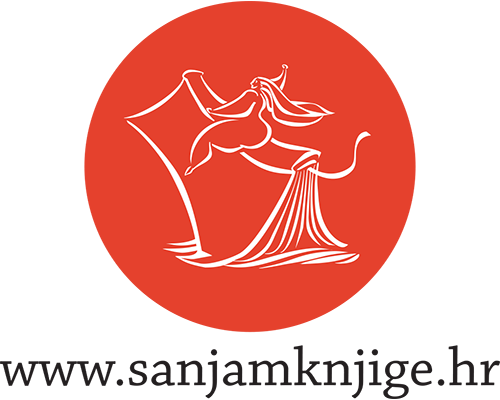BENEATH PUFKA
Not a superficial (Facebook kind), not a quick (website kind), today favourite and most frequent presentation manner, not even report list journalist writing (piece) of the high points by the Book Fair(y) in Istria of its 20th anniversary, with the best of will (as much as 'good will is the best', as Kekec says), can be condensed in three or four pages of the allocated (textual) space in this Catalogue: not even a list of the (most) important authors would fit, not to mention the lists of central topics, focuses, programme units, main, side and other programmes, individual events. Where would their descriptions, reviews, critiques, remarks, intrigues, comments, statements, anecdotes, mischiefs take us… If we included it all, by some strange financial deus ex machina, we would undoubtedly get not one but several hard-covered gallops (with a tail) beneath the jolly rider Pufka (short of PUlski Festival Knjiga i Autora – Pula's Festival of Books and Authors).
Anniversaries are usually marvellous, brilliant, outstanding exceptions for false unbiased and uncritically subjective views (both written and oral), drunken discussions (beyond the facts) and opulent feasts (always welcome). On the verge of such a view and from the position of a long-time (old) collaborator (with occasional detachments and satieties) of the Fair(y) (since its early beginnings in the old headquarters, a former bookstore – quite usual, most of them are today 'former'), catalogue and website editor, Programme board member, journalist, chronicler and what not, I will try, so as to avoid the proverbial anniversary sentimentalism, elevated banality and (painstakingly) stylistically skilfully designed self-praise, only in short to depict the current evident state (local situations and spiritual movements) stemming from the Fair(y)'s existence, its basic substance, its broad production and trade spectrum: books, as well as the city where all this has a permanent residence.
December in the city at night: the northern wind blows, an occasional drunk wanders round the dirty streets, at the Corso (instead of high schoolers) white grocery bags fly in the gusts of wind, the Arena is in pitch dark, stray dogs wander around the Forum, the smoky pubs and cafés echo with the confusing whisper of randomers and with a dull silence… No place to go! This was the image of Pula 20 years ago, a year before the Fair(y) was launched. Last year, the year before and all those before, all the way back to the first edition of the fair(y), despite the northern wind, drunks, randomers, grocery bags and procreated dogs (and their owners), Pula in December swarms with citizens (real and fake readers), visitors and literary guests (visiting writers, moderators, translators, editors, publishers…), the Fair(y) and its books festivalised the wintery, sluggish Mediterranean and weary Istrian city, brought warmth to Pula's winter, just like the film festival has been refreshing it in the summer for more than 60 years. This is a steadfast fact known to everyone (not only the people of Pula)!
The book, from a small private bookstore, Castropola (more accurately from Žgabucin in Istarska Street, behind the shelves, and later in Zagrebačka Street, from the administrative storage, 'a cultural literary salon'), right next to the active and today former (once again, like much else in this city) bus station, awoke the city from its winter slumber and inspired many December sleepers to leave their TV screen, even though the written word means little or nothing to them. The old, forgotten, most personal slogan 'take a book to bed' (the 6th Fair, right before it became a Fair(y)), followed the dictate of globalisation and festivalisation and became a more popular 'see an author in Pula'. Film in the summer (Arena), book in the winter (Croatian Defenders' Home) became a Pula tradition, quality and permanence, almost a custom, cultural anthropology of the (dirty old) town. This is how it seems on the outside, but is it really like this on the inside?
Even though there are (still) two referential, determining and recognisable festivals in Pula, not only in the modest Croatian, but also broader (regional) terms, Pula does not deserve the adjectives of their annual, weekly or two-weekly events. Pula is too old to dwell on it, its age and carefreeness surpasses these insignificant event. The old film festival, derelict with time, sparks a short-lived fire in the summer, and the three times younger, already mature, rising and boiling literary festival, equally briefly lives in the winter (paradoxically, it should be the other way around, knowing the youth of film and old age of books). Pula's urban culture, or more precisely, in this case, cultural industry of festivals is short-lived and minuscule, annually fragmented and season-dependent, occurring in intervals (to use the title of Velikić's essay), it does not have the strength to throw a permanent anchor in the present or climb the firm ladders of the future, but nevertheless it traditionally survives, not the culture in its broadest (urban) scope, but its industry. How is that achieved? The simple recipe (not recommended to other cities) – close all the basic urban mainstays, cinemas, bookstores and cafés (these 'democratic clubs, open to everyone for the price of a cheap cup of coffee', as Zweig sadly writes in the central programme of this year's Fair(y)) – because only when they become non-existent they will have a true value, and the city, having lost its cultural basis, still remains the city of film (summer) and books (winter) thanks to these former values. Pula is gratified with former existence, it despises the present and future, it cannot stand their non-existence in the past. The curse of an ancient city.
Because of this (and many other things), we in Pula have the Fair(y) but we do not have a decent, appropriate, bookstore (just like we do not have a good, appropriate, publisher). But then again, why do we need bookstores or book festivals, these boring spaces where buyers silently linger for a few hours, browse, flip, spin their heads and finally leave empty-handed, in the virtual age of all-devouring internet? Is there any sense in buying a book at the bookstore, in the era of the omnipresent pdf? Of course there is, without ado or superfluous philosophising, only because a man is (above all else) a social and a cultural being. A reason quite sufficient and valid (before we step into page four). Even though books are financially (in Croatia) and in terms of media visibility (everywhere), they are (still) not completely stifled because such a thing, we firmly believe, is impossible out of the very ambivalent, oxymoronic contemporary elementary fact: the electronic media and the digital www-world of entertainment have not even touched and let alone exceeded the phenomenon and dignity of a good book.
As much as books are a public, civilizational and social need, they are equally personal, literally intimate striving to (self-)cognition and pleasure. A book is a faithful saviour of thoughts from oblivion, a warm redeemer from the endless terror of fibre-optical media whose nonsense, futile information and superfluity feed oblivion. A book is a path (and a mirror) of one's own choice of (critical) world view and personal freedom. Travellers to Pula (the city where roads end) are many each year, and as long as they keep coming, the Fair of (good) books will keep living. Pufka's hard-cover, despite obstacles and impediments, still rides strong.
Miodrag Kalčić




